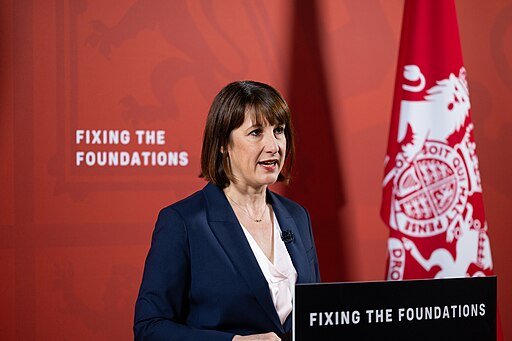Unexpected GDP growth of 0.1% defies forecasts, but doubts linger over Reeves’ economic strategy.
Britain’s economy unexpectedly edged forward at the end of last year, defying gloomy forecasts of contraction. The Office for National Statistics (ONS) revealed that GDP grew by a slim 0.1% between October and December 2024—small but significant, given that the Bank of England had predicted a 0.1% decline.
Chancellor Rachel Reeves wasted no time in seizing the moment. “We are moving further and faster to put money in people’s pockets,” she declared, framing the marginal growth as evidence of Labour’s commitment to economic revival. However, beneath the surface, cracks in the economy remain stark, and critics argue this minor uptick does little to counteract concerns over rising taxes, inflationary pressures, and fragile business confidence.
A Glimmer of Growth—But at What Cost?
For months, economists have sounded alarms about the UK teetering on the brink of recession. The Bank of England had already slashed its growth forecast for 2025 to a meagre 0.75%, with a slightly more optimistic outlook of 1.5% expansion in 2026 and 2027. While the latest figures suggest a slight deviation from the worst-case scenario, they hardly paint a picture of economic resurgence.
Businesses remain wary, particularly after Reeves’ controversial decision to hike national insurance contributions and raise the minimum wage. Many feared these measures would push firms to cut jobs or pass costs onto consumers. While Reeves insists her policies will boost living standards, uncertainty looms over whether the UK’s growth can sustain itself beyond a single quarter.
Political Battleground: Labour vs. Reality
This unexpected growth offers Reeves a brief respite from growing criticism over her economic policies. However, political opponents remain unconvinced. The Conservatives argue that the economy’s fragility is proof that Labour’s tax policies stifle enterprise and deter investment. Former Chancellor Jeremy Hunt was quick to point out that a 0.1% increase hardly signals a robust recovery, dismissing it as “a blip rather than a bounce.”
Meanwhile, within Labour’s own ranks, concerns persist about the government’s ability to deliver tangible improvements to living standards. Housing Minister Matthew Pennycook refused to commit to a timeline when asked when people would feel financially better off. “I’m not going to pick an arbitrary date,” he told BBC Breakfast, a response that fuelled speculation that the government itself remains unsure about the road ahead.
The Road Ahead: Optimism or Delusion?
With inflation still biting and economic uncertainty high, the UK’s long-term outlook remains murky. The Bank of England’s cautious approach suggests that interest rates are unlikely to drop significantly in the near future, meaning borrowing costs will stay elevated for businesses and households alike.
For Reeves, this momentary win is unlikely to silence critics. She faces the daunting challenge of proving that Labour’s policies can drive sustained growth, not just statistical anomalies. As businesses weigh their next moves and households continue to feel the squeeze, the real test of Labour’s economic vision is yet to come.
THE GUARDIAN
Rachel Reeves faces scrutiny over her banking career after a BBC investigation revealed inconsistencies in her work history and allegations of excessive expense claims. The report found she overstated her tenure at the Bank of England by nine months and was subject to an internal review at HBOS over expense claims, though no wrongdoing was determined. A whistleblower alleged Reeves and two other managers had a “cavalier attitude” towards spending, including £152 on a handbag and perfume for a boss. Reeves’s spokesperson denied she was ever questioned over expenses and insisted all claims were within company rules.
Keir Starmer defended Reeves, stating he had full confidence in her integrity and that she had addressed any concerns from her banking career. He praised her economic leadership, highlighting her role in stabilising the economy. Downing Street reaffirmed that there were no concerns about her conduct. Reeves’s LinkedIn profile was also updated after the BBC’s inquiry, with her team citing an administrative error for the incorrect dates. Starmer dismissed criticism, focusing on Labour’s economic priorities.
THE TELEGRAPH
Rachel Reeves has been accused of being investigated over expenses during her time at HBOS, with claims she and two managers misused company funds for gifts, taxis, and entertainment. A whistleblower alleged excessive spending, including £152 on a handbag and perfume for a boss. Reeves’s spokesperson denied any wrongdoing, stating she was unaware of an investigation and left HBOS on good terms.
The BBC also found she exaggerated her tenure at the Bank of England, overstating her time there by nine months. Reeves’s team called this an administrative error.
Keir Starmer defended Reeves, insisting he had full confidence in her and that she was focused on reviving the economy. Critics, including Kemi Badenoch and Reform UK’s Richard Tice, accused her of misleading the public and called for full transparency. Labour MPs expressed concerns, while Downing Street maintained Starmer had no doubts about her integrity. Reeves’s former colleagues also defended her, saying expenses were properly authorised.
